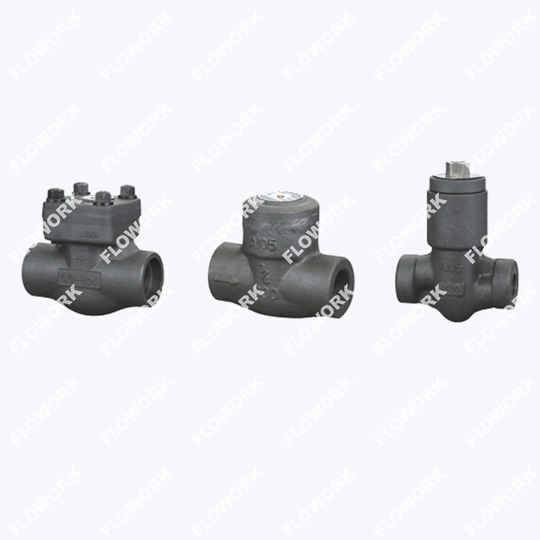
1、You are in restricted area and need password. Please Contact us to obtain documents.
2、PasswordIf you have any questions about quotation or cooperation, please feel free to send us inquiry. Inquiry us
| Size: | 1/2"-2" |
| Pressure: | 150LB-2500LB |
| Body Material: | A105, F304, F304L, F316, F316L, LF1, LF2, LF3, LF9, F51, F53, F11, F22, etc. |
| Seal Material: | STELLITE, 13Cr, SS304, SS316, etc. |
| Connection Type: | Flanged, Butt Welded, Socket Welded, NPT |
| Face to Face Dimension: | ASME B16.10 |
| Flange End Dimension: | ASME B16.5 |
| Butt Welded Dimension: | ASME B16.25 |
| Design and Manufacture: | API 602 |
| Test Standard: | API 598,API 6FA, ISO 15848-1-2 |
Zero leakage, compact structure, easy for maintenance
Disc with swing type or ball type
Available with bolted bonnet, pressure seal bonnet, fully welded seal bonnet, etc.
Main materials: A105, F11, F22, 304, 304L, 316, 316L, LF2, etc.
Suitable for petroleum, chemical, pharmaceutical, chemical fertilizer, power industry, low temperature, and other conditions of the pipeline
A non-slam check valve, also known as a no-slam check valve or silent check valve, is a type of check valve designed to prevent water hammer, a phenomenon that can occur in pipelines when a fluid flow is suddenly stopped or reversed. Non-slam check valves are commonly used in applications where preventing water hammer is essential, such as in water and wastewater systems. api 6d ball valve
These valves typically feature a specialized design, often with a hinged disc or a dashpot mechanism. When the flow of fluid is reversed or stopped abruptly, the non-slam check valve allows the disc to close gradually, reducing the impact and noise associated with traditional check valves. This controlled closure minimizes pressure surges and the potential for damage to the pipeline and system components. Non-slam check valves are valued for their ability to maintain system integrity and protect against the damaging effects of water hammer. forged ball valve
When a well check valve fails, it can have several adverse consequences:
1.Backflow: The primary function of a well check valve is to prevent water from flowing back down the well after the pump shuts off. A failed check valve allows backflow, which can lead to water hammer, damaging the pump and pipes.
2.Loss of Prime: Backflow can cause the pump to lose its prime, requiring you to reprime the pump, which is an inconvenience and can be labor-intensive.
3.Reduced Pump Efficiency: With backflow, the pump may have to work harder to re-establish pressure, leading to increased energy consumption and potential wear and tear on the pump.
4.Contaminated Water: Backflow can introduce contaminants and bacteria into the well, affecting water quality and safety.
5.Frequent Pump Cycling: A failed check valve may lead to rapid pump cycling, reducing the pump's lifespan and efficiency. carbon steel gate valves
Replacing a failed well check valve is essential to maintain the well system's functionality and prevent costly repairs and water quality issues.
A pneumatic check valve, also known as an air check valve, is a one-way valve used in pneumatic (air) systems to control the direction of airflow. It allows air or gas to flow in one direction while preventing backflow. Pneumatic check valves are essential components in various pneumatic applications, ensuring that air flows in the intended direction to operate equipment effectively. They are characterized by a hinged or spring-loaded internal element that opens and allows air to pass when there is positive pressure but closes to block airflow when there is a reverse or no pressure differential. Pneumatic check valves are employed in industries such as manufacturing, automotive, and automation to maintain the integrity of pneumatic systems, prevent equipment damage, and ensure proper operation. high temperature gate valves
The purpose of a check valve, also known as a non-return or one-way valve, is to control the direction of fluid or gas flow in a piping system. It serves several critical functions:
1.Backflow Prevention: Check valves allow flow in one direction while preventing reverse flow or backflow. This ensures that fluids or gases move in the desired direction and do not flow back into the system, which can lead to contamination, loss of pressure, and damage to equipment, low temperature ball valves.
2.Water Hammer Protection: Check valves help minimize the potentially damaging effects of water hammer, which is the sudden pressure surge that can occur when flow is abruptly stopped or reversed in a pipeline.
3.System Efficiency: By maintaining the flow direction, check valves ensure the proper operation and efficiency of various systems, including plumbing, HVAC, hydraulic, and pneumatic systems.
4.Safety and Compliance: Check valves are used in applications where safety and regulatory compliance are paramount, such as in preventing the backflow of contaminated water into potable water supplies.
Check valves should be added to piping systems under various circumstances:
1.Preventing Backflow: When you want to ensure that fluids or gases flow in one direction and prevent backflow, check valves are essential. This is crucial in preventing contamination, maintaining pressure, and protecting equipment.
2.Water Hammer Protection: In systems where abrupt stops or reversals of flow can lead to water hammer and potential damage, check valves should be installed to mitigate these effects, api602 forged gate valve.
3.System Efficiency: To maintain the efficiency and intended operation of a system, check valves may be needed to control the direction of flow.
4.Safety and Compliance: In applications where regulatory compliance is critical, such as preventing cross-contamination in water supplies, adding check valves is a necessary safety measure.
5.Specific Process Needs: Some industrial processes and machinery require check valves to control fluid or gas flow in a precise manner.
The decision to install check valves should be based on the specific requirements and challenges of your piping system.
Send us a message if you have any questions or request a quote.

A reply from our experts within 24 hours

The latest detailed product catalugue

One-stop service for your project